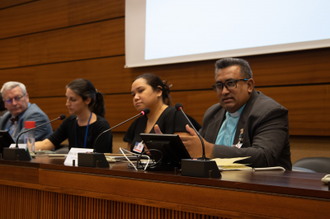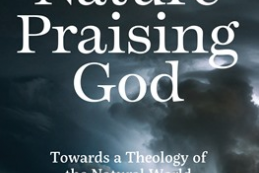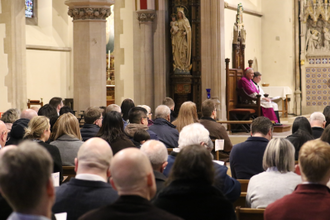Impact of climate change: women and children bearing the brunt

Rev James Bhagwan, speaking on implications of climate-induced displacement. Photo: Thomas Kleinveld / Franciscans International.
From 2020 to 2021, more than 50 million people were displaced due to weather events and faced risks of trafficking and even death as well as discrimination based on race and gender. This finding emerged from the report of Ian Fry, special rapporteur on the promotion and protection of human rights in the context of climate change, to the 53rd session of the United Nations (UN) Human Rights Council meeting in Geneva from 19 June-14 July.
Speaking at a side event convened by faith groups on the human rights implications of climate-induced displacement and the urgent need for responses, Fry said that climate change events "may deprive people of their right to food, water, sanitation, housing, health, education, and, for some, the right to life." More than 50,000 people lost their lives while migrating between 2014 and 2022.
Fry called for "an optional protocol under the Convention on the Status of Refugees to address displacement and legal protection for people all over the world affected by the climate crisis."
The side event lifted up the voices of affected communities, in particular those who come from the small island states, Indigenous Peoples, women, and youth.
Fr Rene Arturo Flores Medina from La Red Franciscana para Migrantes (Franciscans Network for Migrants) shared that in Central America, the combined and intersecting impacts of the COVID-19 pandemic, climate change, and socio-economic inequality have forced thousands of people from this region to resort to migration.
Medina said that the two main manifestations of climate change in the region are so-called "dry corridors and hurricanes" and both adversely affect food sovereignty.
When hurricanes Eta and Iota hit Panama in 2021, "the response to the displaced was to place them in provisional shelters such as schools and churches…All this in the context of the public health crisis," Medina added. Two years after the climate disaster, only five out of the planned 116 houses have been built for climate-displaced families.
Iemaima Vaai, representing the Methodist Church in Samoa and youth advisor to the World Council of Churches, concurred with the report of the special rapporteur and underlined that women and children bear the brunt of the human rights impacts of climate-induced displacement.
Vaai shared that in the Pacific, displacement due to extreme weather events and rising sea levels entails "loss of Indigenous knowledge" as well as affects livelihoods, particularly fishing which women traditionally do. Displacement also causes deep emotional and mental pain especially for women, mothers, and grandmothers, who traditionally bury the umbilical cords of their children in the land, Vaai said.
Nonetheless, Pacific women and communities derive resilience and healing from cultural and spiritual beliefs and practices that emphasise sacred relationships and the interconnectedness of people, land, and sea, Vaai added.
Rev. James Bhagwan, general secretary of the Pacific Conference of Churches, affirmed that mitigating the trauma of forced relocation and ensuring dignity in the process of migration are key issues for the region.
"The impact of climate change is being experienced now…driving many Pacific islanders to circular migration to Australia and New Zealand and the US for work…It is important that the legal processes also protect and support pastoral care and cultural protocols of leaving, arriving, and receiving. These protocols are important for the dignity of migrants," Bhagwan said.
Held on 28 June, the side event was organised by the Geneva Interfaith Forum on Climate Change, Environment, and Human Rights composed of ACT Alliance, Brahma Kumaris World Spiritual University, Dominicans for Justice and Peace, Franciscans International, Lutheran World Federation, and the World Council of Churches.
In a statement to the 53rd session of the Human Rights Council, the Geneva Interfaith Forum called for "meaningful and effective participation of affected communities" as well as people-centred, human rights-based, gender-responsive, and holistic approaches to policies around human mobility in the context of the accelerating climate emergency.


















